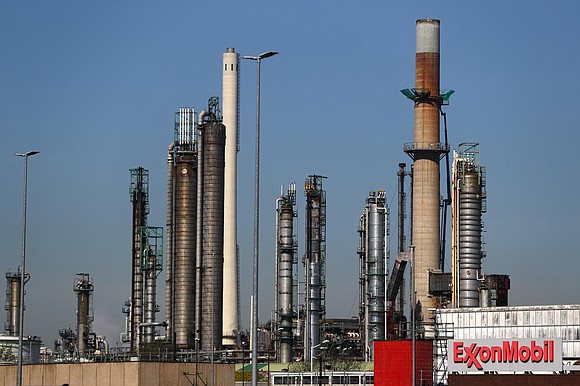Exxon's exit means there's just one oil company left in the Dow
CNN/Stylemagazine.com Newswire | 8/25/2020, 12:08 p.m.

By Julia Horowitz, CNN Business
(CNN) -- A shake-up in the Dow Jones Industrial Average shows just how far once mighty oil companies have fallen in the corporate pecking order.
What's happening: S&P Dow Jones Indices, which manages the benchmark index of 30 stocks, is adding Salesforce, Amgen and Honeywell to the Dow while giving ExxonMobil, Pfizer and Raytheon Technologies the boot. The decision was made to balance out the disruption from Apple's 4-to-1 stock split, which takes effect next Monday.
Unlike some other indexes, the Dow is weighted by the share price of its components, and not their market value. Adding Salesforce helps ensure the tech industry is properly represented.
It's a symbolic knock for Exxon, which was once the world's most valuable public company and has been a member of the Dow since 1928. The oil and gas giant has seen shares plunge nearly 40% this year amid huge pressure on crude prices, while tech companies like Amazon and Google parent Alphabet have rallied.
Once Exxon is removed, Chevron will be the Dow's only oil and gas company.
Bernstein oil analyst Oswald Clint told me that it's too early to count Exxon out entirely. While sentiment amid the pandemic is "very depressed," commodity prices could rally if demand recovers, giving Exxon a boost. (Companies can be added back to the Dow; Honeywell is rejoining after it was kicked out in 2008.)
But for the time being, Exxon remains a "tough sell," Clint said. He noted that investors have recently favored oil companies in Europe like BP and Equinor that are speeding up their transition to renewable fuel. Exxon, for its part, has stuck to its old playbook.
Investor insight: BP shares rose sharply after the company said earlier this month it would slash oil production by 40% and pour billions into green energy. They've since dropped again, but are still up more than 2% this month.
Though the pandemic has sparked debate about whether oil demand can ever recover, Clint emphasized that the consensus view among industry professionals is that it will bounce back once the threat of the virus recedes.
There's plenty of disagreement, however, about how long a recovery could take. A more protracted comeback would hurt the oil and gas sector as big investors face calls to ditch assets that promote the use of fossil fuels.
Market moves: Shares of Salesforce are up 3% in premarket trading, while Amgen and Honeywell are 4% and 3.5% higher, respectively. Exxon's stock is off 1.5%, while Pfizer fell 1% and Raytheon dropped 2%.
US-China trade talks are making progress
The relationship between the United States and China is deteriorating on a number of fronts, but the world's two biggest economies say that trade talks are still moving ahead.
The latest: High-level officials from both countries — including US Treasury Secretary Steven Mnuchin, US Trade Representative Robert Lighthizer and Chinese Vice Premier Liu He — spoke by telephone late Monday, according to statements released by their respective governments.
"Both sides see progress and are committed to taking the steps necessary to ensure the success of the agreement," Lighthizer's office said, referring to the "phase one" trade deal reached earlier this year. China's Ministry of Commerce called the talks "a constructive dialogue."
Investors welcomed the news, which comes more than a week after US and Chinese trade negotiators were expected to meet via video call. US President Donald Trump said he called off that meeting because he was unhappy with Beijing.
"I canceled talks with China," Trump told reporters last week, according to media reports. "I don't want to talk to China right now."
Big picture: The United States and China are sparring over technology companies like Huawei, Tencent and TikTok owner ByteDance, a fight that could escalate in the coming weeks. But the "phase one" trade deal that took effect in January — which included a commitment from Beijing to ramp up purchases of US goods — remains largely intact.
Watch this space: TikTok sued the Trump administration on Monday in a last-ditch effort to block the president from banning the short-form video app from the United States in September. Legal experts say the strategy may be to force a delay until after the US election.
Investing in KitKats and Big Macs is a pandemic winner
Americans are stressed and cooped up at home.
That's why hedge fund Infusive Asset Management decided the best way to make money during the health crisis is to invest in companies that cater to indulgences like Big Macs, KitKats and Johnny Walker, my CNN Business colleague Matt Egan reports.
"People want to spoil themselves and treat themselves to something that is enjoyable," Andrea Ruggeri, CEO of Infusive Asset Management, told CNN Business.
The play: Infusive created an ETF under the ticker JOYY that tracks companies that meet "the deepest emotional needs of the global consumer." Major holdings include Nestle, McDonald's, Oreo maker Mondelez and LVMH, the luxury goods company that owns Louis Vuitton, Sephora and Hennessy. The fund also owns beer and spirits company Diageo.
The playbook is working. The ETF has surged nearly 22% this year — almost four times the gains logged by the S&P 500.
Up next
Best Buy and J.M. Smucker report results before US markets open. Nordstrom, Salesforce and Urban Outfitters follow after the close.
Also today: US new home sales in July and consumer confidence data for August post at 10 a.m. ET.
Coming tomorrow: More US economic data arrives with durable goods orders for July.




